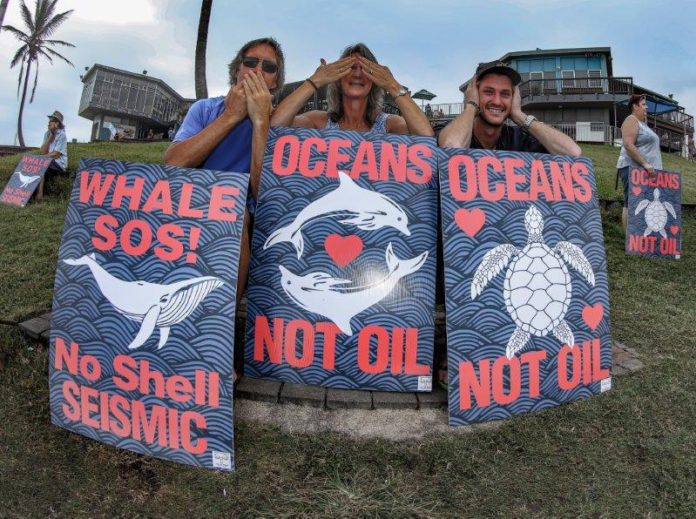Last Sunday (5, December 2021) saw thousands of South Africans gathering along the coastline to object to Royal Dutch Shell’s seismic surveying on the Wild Coast. Forming part of this nationwide gathering – in coalition with Oceans Not Oil – was the KZN Mid-South Coast Ocean Supporters NPO (KMOS) which called on residents of Umkomaas, Scottburgh and Pennington to join in the action.
Central to the objection is Shell’s 3D seismic survey of an area from Morgan Bay to Port St Johns which will map out potential oil and gas deposits using military-grade seismic cannons (or ‘airguns’). These guns will fire deafening shock-wave emissions of over 200 decibels every 10 seconds, for 24 hours a day and will continue to do so for the next five months – with potentially devasting results for the marine animals and ecologically sensitive coastal areas.
Coming in the wake of COP26 and the global call to reduce by carbon emissions by moving away from non-renewable energy sources such as fossil fuels, South Africans are uniting in the call to halt such environmentally destructive methods. The Sunday gathering, which extended from Richards Bay in northern KZN through to Port Edward on the Eastern Cape border, is part of a multi-pronged approach at impeding the seismic survey. Civil society, local businesses and residents are all rallying to prevent activities that could impact, not only the sensitive marine ecology, but livelihoods dependent on the ocean as well.
“I am so overwhelmed at the support we saw from our communities on Sunday and would like to sincerely thank everyone who came out to voice our collective outcry that our very own legal system has failed us,” said Claire Taylor, co-founder of the KZN Mid-South Coast Ocean Supporters NPO (KMOS), organiser of the event (in coalition with Oceans Not Oil). “It is now condoning of ‘less-than-ethical loopholes’ to continue against the backdrop our climate crisis.
“We are already seeing the devastating results of climate change throughout the world, and yet such backwards-thinking, profit-driven, fossil fuel exploration will still continue to deplete our oceans of their resources, and the very lifeblood of planet earth. Are we beyond the tipping point?”
Taylor explained that the blasting has already begun – as has the annual whale migration to the south. However, Shell claims that there’s no harm and the whale can alter a migration course which has served the ecosystem for millions of years.
“The sound emissions will result in juveniles not being able to suckle because they will be separated from the mother due to these detrimental human causes,” she continued. “We cannot simply sit back and watch capitalistic exploits kill what we desperately need to save. We are calling on our international stakeholders to put pressure on the South African government and its corporate counterparts to hold them accountable for the hefty promises made at Cop26 hardly a month ago.”
She also cited the multi-billion dollar grant earmarked for South Africa’s transition to clean energy: “Imagine our dismay at the arrival of the Amazon Warrior, chugging along to blast away intricate ecosystems in not one, but four MPA’s (Marine Protected Areas) situated within the 6 000km2 destruction area of the Wild Coast.”
The KZN Mid-South Coast gathering included objections on the shore, on the water and in the air. Ocean lovers and marine-based businesses went out onto the water, with World of Wings’ aircraft flying overhead in an aeronautical display of support and capturing the event from above. Even the marine life came out in full force of the objection with dolphins swimming in among surfers and paddlers on the backline of Scottburgh Beach.
The seismic survey, which is being conducted by the research vessel, Amazon Warrior, owned by Shearwater GeoServices, initiated its blasting of around 250 decibels starting last week. If not stopped, the vessel will blast along the Wild Coast for five months before continuing for a further five months in the Eastern Cape from Gqeberha to Plettenburg Bay.
The initial survey area – Transkei Block Exploration Right – covers more than 6 000 km2 of ocean surface and is home to four of South Africa’s 41 Marine Protected Areas (MPAs). These protect unique marine biodiversity with a high number of species found nowhere else in the world. The impacts of the sound from the seismic survey travels great distances through water, meaning that the marine life in the MPAs may be impacted.
Liz McDaid from The Green Connection reiterated the concerns, stating: “We don’t need to explore the oceans for oil or gas – we need to move to renewables because of climate change. Seismic surveys are a precursor to drilling and exploration, and we don’t need that either. The effect of sound on various marine ecosystems is well-known in terms of damage to different species and, from a precautionary principle, we should have a moratorium on all seismic surveys along the South African coast.”
For more information, contact:
Claire Taylor: 076 503 7895
This is a constantly evolving story so keep updated by checking the Facebook page ‘Mid to South Coast KZN Say NO to seismic surveys’ and follow these hashtags on social media:
#oceansnotoil
#tohellwithshell
#savethewildcoast
#phantsikweShell (down with shell)
#shukumoshalwandle (don’t destroy the sea)
#Shellimoshindalo (shell is destroying the environment)
#sukumoshindaloyethu (don’t destroy our env)
#asifuniseismicblasting (we don’t want seismic blasting)
#shellakungenwaapha (shell is not allowed to enter here)












